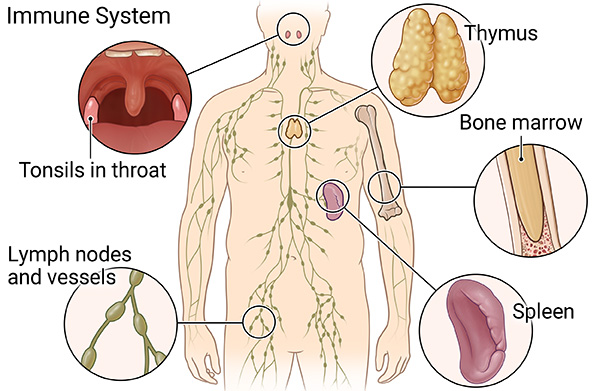Immune System Disorders
Your immune system is your body’s defense against infections and other harmful invaders. Without it, you would constantly get sick from germs, such as bacteria or viruses.
Your immune system is made up of special cells, tissues, and organs that work together to protect you.

The lymphatic system is a major part of the immune system. It's a network of lymph nodes and vessels. Lymphatic vessels are thin tubes that spread, like blood vessels, all over the body. They carry a clear fluid called lymph. Lymph contains tissue fluid, waste products, and immune system cells. Lymph nodes are small, bean-shaped clumps of immune system cells. They are connected by lymphatic vessels. They contain white blood cells that trap viruses, bacteria, and other invaders, including cancer cells.
White blood cells are the cells of the immune system. They are made in 1 of your lymph organs, such as the spleen or thymus, and in the bone marrow.
What can go wrong with your immune system?
When your immune system doesn't work the way it should, it's called an immune system disorder. You may:
-
Be born with a weak immune system. This is called primary immune deficiency.
-
Get a disease that weakens your immune system. This is called acquired immune deficiency.
-
Have an immune system that is too active. This may happen with an allergic reaction.
-
Have an immune system that turns against you. This is called autoimmune disease.
Immune system disorders
Here are some common examples:
-
Severe combined immunodeficiency (SCID). This is an example of an immune deficiency that is present at birth. Children are in constant danger of infections from bacteria, viruses, and fungi. This disorder is sometimes called “bubble boy disease.” In the 1970s, a boy had to live in a sterile environment inside a plastic bubble. Children with SCID are missing important white blood cells. This disease is deadly without treatment.
-
Temporary acquired immune deficiencies. Your immune system can be weakened by certain medicines, for instance. This can happen to people on chemotherapy or other medicines used to treat cancer. It can also happen to people after organ transplants who take medicine to prevent organ rejection. Also, infections, such as the flu virus, mono (mononucleosis), and measles, can weaken the immune system for a short time. Your immune system can also be weakened by smoking, alcohol, and poor nutrition.
-
AIDS. HIV, which causes AIDS, is an acquired viral infection that destroys important white blood cells and weakens the immune system. People with HIV/AIDS can become seriously ill with infections that most people can fight off. These infections are called opportunistic infections because they take advantage of weak immune systems.
An overactive immune system
If you are born with certain genes, your immune system may react to substances in the environment that are normally harmless. These substances are called allergens. Having an allergic reaction is the most common example of an overactive immune system. Dust, mold, pollen, and foods are examples of allergens.
Some conditions caused by an overactive immune system are:
-
Asthma. The response in your lungs can cause coughing, wheezing, and trouble breathing. Asthma can be set off by common allergens like dust or pollen or by an irritant like tobacco smoke.
-
Eczema. An allergen causes an itchy rash known as atopic dermatitis.
-
Hay fever (allergic rhinitis). Sneezing, a runny nose, sniffling, and swelling of your nasal passages are from indoor allergens, such as dust and pets, or outdoor allergens, such as pollens or molds.
-
Food allergy. Severe allergic reactions that are caused by foods.
Autoimmune disease
In autoimmune diseases, the body attacks normal, healthy tissues. Experts don't know why. It's likely a combination of a person’s genes and something in the environment that sets off those genes.
Three common autoimmune diseases are:
-
Type 1 diabetes. The immune system attacks the cells in the pancreas that make insulin. Insulin removes sugar from the blood to use as energy.
-
Rheumatoid arthritis. This type of arthritis causes swelling and deformities of the joints. An autoantibody called rheumatoid factor or anti-CCP is in the blood of some people with rheumatoid arthritis.
-
Lupus. This disease attacks body tissues, including the lungs, kidneys, and skin. Many types of autoantibodies are found in the blood of people with lupus.
Experts don't know what causes autoimmune diseases. But many different factors seem to be involved. Symptoms vary. They depend on which disease develops and which part of the body is affected. Blood tests may be used to check for an autoimmune disease. Treatment will depend on the type of disease diagnosed. Treatment may include medicines that lower the immune system's activity. If you have an immune system disorder, learn as much as you can about it. And work closely with your doctor to manage it. You may need to visit a number of doctors before you get an accurate diagnosis.